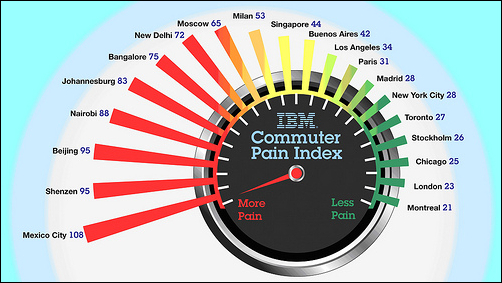by Shane Henson — September 16, 2011—Commuting to work is a way of life for countless people around the world, but that does not necessarily mean they enjoy it. IBM’s annual Commuter Pain Index, which ranks the emotional and economic toll of commuting in the 20 cities sampled on a scale of one to 100, found that commuting not only makes many people angry, but can affect their physical health and performance on the job, as well.
For the Commuter Pain Index, IBM performed a comprehensive survey of 8,042 drivers in 20 cities. Drivers were asked a total of 27 questions, such as the duration of their longest commute, their best and worst roadways, and how gas prices affect their choices. According to IBM, the survey is conducted to better understand consumer attitudes around traffic congestion as the issue reaches crisis proportions around the world and higher levels of auto emissions stir environmental concerns. Findings include:
- Despite improving traffic conditions, 12 of the 15 cities surveyed in both 2010 and 2011 reported year-over-year increases in respondents who said that roadway traffic has increased their stress levels, with several cities posting substantial increases.
- Eleven of the 15 cities surveyed in both 2010 and 2011 reported year-over-year increases in respondents who said that roadway traffic has made them angry, with several cities posting substantial increases.
- Eleven of the 15 cities surveyed in both 2010 and 2011 reported year-over-year increases in respondents who said that traffic has negatively affected their performance at work or school, with several cities posting substantial increases.
- Eleven of the 15 cities surveyed in both 2010 and 2011 reported year-over-year increases in respondents who said that roadway traffic has made them angry, with several cities posting substantial increases.

The survey results also suggest that aggressive infrastructure investment in some of the most rapidly growing economies seems to be paying off. Compared with other cities surveyed, more commuters in Bangalore, New Delhi, Beijing and Shenzhen reported improvement in traffic conditions over the last three years.
For example, last year Beijing was expected to invest approximately 80 billion yuan to improve its transportation infrastructure, and Mexico City is making a significant investment of $2.5 billion US over the next few years to better support the growing demands of its transportation network in one of the most populated urban areas in the world. With more than one billion cars on the road worldwide, cities are continuing to address traffic congestion and looking for new ways to handle the growing demand.
The survey results also reflect an increased willingness to use public transportation and technology to improve the commute. Overall, 41 percent of those surveyed believe improved public transit would help reduce traffic congestion.




